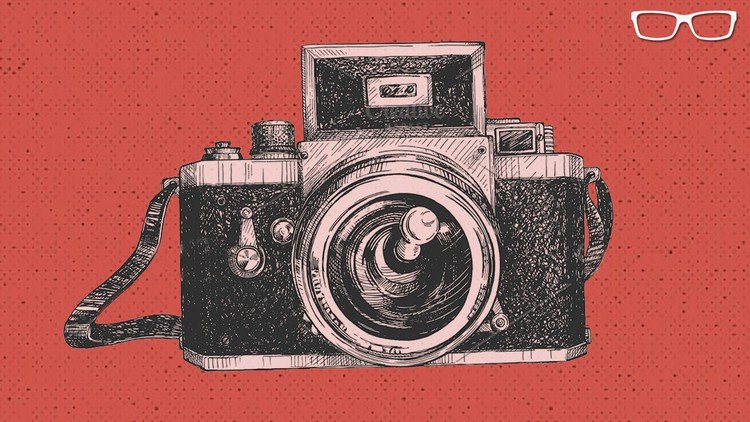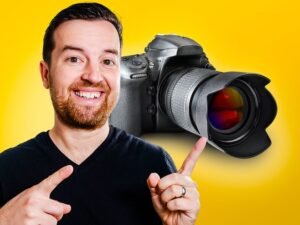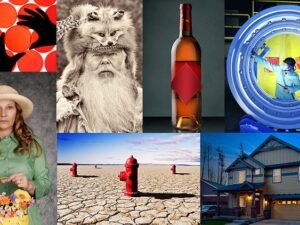- +91 844 9090 904
- info@maximumlearning.io
- Sector 62, Noida, 201309
- Description
- Curriculum
- FAQ
This photography course changed this photographer’s life…
“After more than 20 years of taking photos as a hobby, I decided that I wanted to know more about photography and finally leave “Auto-mode” behind me.
Should have done this much sooner: Chris explains everything in a simple manner but very thoroughly, and now; finally, all the puzzle pieces fall into place.
Great course, highly recommended.”
Martijn Tilgenkamp
***********
______________________________
Highlights…
Master Photography | 28Hr Complete Guide Includes 209 Page Companion PDF
*** 28 hours of photography video tutorials
*** 200+ Photography E-book w/150+ images to use with this Photography Masterclass
______________________________
Have you ever told yourself or someone close to you… “the struggle is real. I look at other photos and say mine will never be that good.”
It doesn’t have to be that way. Your photos will drastically improve once you know the 4 core ingredients to create amazing images.
“What are the 4 ingredients, you ask”… equipment, light, composition + editing.
How can this photography masterclass help you “master” these ingredients and, most of all, help you create amazing images?
-
First, I (Chris Parker) have 33 years of experience as a professional photographer and 15 years of experience teaching others photography.
-
I’ll walk you through, step-by-step, each ingredient, so you fully understand each concept. Let’s review each ingredient and what you’ll learn.
\\\\\\\\\\\\\\\\\\\\\\
Jeff D. Jones
“Chris Parker is amazing. He explains everything, so it’s crystal clear the first time, so you don’t have to keep replaying the lessons to figure out what he was talking about. I’ve been a photographer myself for over twenty years, and I feel that to stay fresh, it’s a good idea to take these “refresher” courses like Chris.
I highly recommend this course to anyone and everyone who is interested in photography.”
\\\\\\\\\\\\\\\\\\\\\\
INGREDIENT 1: EQUIPMENT
It’s not the gear that you have that allows you to create great images… it’s knowing how to get the most out of what you have!
If you master Lighting and Composition, you’ll be able to create spectacular images whether you have a smartphone, a $500 DSLR, or a $10,000 Mirrorless camera.
But before you can master Lighting and Composition, you need to understand how your camera AND lenses work, their limitations, and more.
\\\\\\\\\\\\\\\\\\\\\\
Desislava Toteva Garcia
“This course is extremely helpful!! I love the way you explain everything, + I love your vibe!! 100 % recommended!!”
\\\\\\\\\\\\\\\\\\\\\\
With that knowledge, you’ll elevate your photographic knowledge beyond 90% of photographers in the world.
When you complete this section, you’ll understand…
-
How to read a Histogram for perfect exposures every time
-
You’ll know the difference between Dynamic and Tonal range and how that affects your exposure and…
-
How your camera’s Tonal range limitation can affect what you want to create… and how to overcome it
-
The first lens you should buy and why
-
Why your camera gets exposure wrong and how to fix it
-
How to take full creative control over your camera and shoot in Manual mode (easy… step-by-step instructions)
-
Why I don’t recommend Manual Mode for beginners and I’ll reveal a better alternative!
-
How to get sharp images every time
-
Why lenses aren’t always perfect and how to avoid imperfections
-
You’ll discover the difference between Focal length and Field of View and their purpose in creating amazing images
-
Why you should consider the Crop Factor before buying a lens
-
How lens Aberrations can negatively affect your photos and how to overcome them
\\\\\\\\\\\\\\\\\\\\\\
Shelly Woesthoff
“I really liked the interactive camera demonstration indoors and outdoors. Makes it much easier to wrap your mind around the different settings when you can see it in real-time.”
\\\\\\\\\\\\\\\\\\\\\\
Start by mastering the camera gear you have. Then, move on to mastering…
INGREDIENT 2: LIGHT
Although this is the second ingredient… it’s actually the number one ingredient to master. Why should it be number one?
Well, without it, you wouldn’t be able to create an image. It’s like trying to create a photo with your lens cap on. How do you think that will work out?
With Light, you can tell a story by shaping the light based on your creative vision. Light can be soft or hard, and can even be of different colors.
Harnessing light is essential for creating amazing images. Once you complete the Light mastery section, you’ll understand…
-
The difference between soft and hard light and why you may want to use one over another
-
Where light comes from and why it’s important to your photography
-
How your camera sees light and its limitations
-
The 3 behaviors of light and how they can alter what you capture
-
How contrast can change the mood of your image
-
The 4 characteristics of light and how they can affect the quality of your images
-
And more
\\\\\\\\\\\\\\\\\\\\\\
Ryan Lehoullier
“Phenomenal course. Clearly, a lot of time and effort went into it. The course is informative, with quality content and valuable information. Thank you for this.”
\\\\\\\\\\\\\\\\\\\\\\
This section is in the process of being re-recorded and will also include new content. See (below) the last section for more information.
INGREDIENT 3: COMPOSITION
Now that you’ve mastered Light and are a master of your camera gear, it’s time to elevate your photographic prowess by mastering composition.
This will include…
-
A true understanding of what composition is and how it can make your images better
-
10 composition rules that will improve your images instantly
This section is in the process of being re-recorded and will also include new content. See (below) the last section for more information.
\\\\\\\\\\\\\\\\\\\\\\
Kris Chartrand
“I purchased my canon rebel nearly 10 years ago, and I had never attempted to play with the manual settings, this course truly helped me understand, and the images he actually uses and does as a walk-through truly helped the understanding quite a bit. I can’t wait to start playing around and testing what I have learned. Thank you!”
\\\\\\\\\\\\\\\\\\\\\\
INGREDIENT 4: EDITING
Now that you’re impressing family and friends with your photography skills, one more thing will take you over the top… editing.
Photo Editing, in and of itself, is an art form. Master editing, and you’ll leave your mark on the world for generations to come. Yes, editing is that powerful.
Half the goal of editing is developing your own editing style. It won’t be easy… and will take some time.
I’ll guide you on your editing journey with several image manipulation apps that can help you achieve your creative vision. This will include introductory’s to…
-
Lightroom
-
Photoshop
-
GIMP
-
Darktable
-
And more
Plus, I’ve included a 4 step process for “developing” your editing style.
\\\\\\\\\\\\\\\\\\\\\\
Robert Turner
Using plain simple language, Chris manages to make what is seemingly complicated understandable – I’ve been playing around with cameras for years and mostly been flying by the seat of my pants, I’m now starting to understand how I managed to jag those couple of really great shots, and now hopefully will be able to create even more ‘great shots’.
\\\\\\\\\\\\\\\\\\\\\\
How To Get the Most From This Photography Class
-
1209 Page Photography Masterclass Ebook
This Photography Masterclass PDF E-book includes 130 pages and over 150 images!
The link to download is in the text file attached to this article (right column).
-
2Get Inspired
-
3Photography Beginner? Start Here...
-
44 Key Ingredients For Mastering Photography
-
5Painting With Light
-
630 Years of Photography Experience in 9 Minutes
-
7Photography WB
-
8In-Studio Deep Dive - Putting It All Together
-
9Outdoor Demonstration
-
10Pro Editing Tips
-
115 Photography Tips
-
12Practice Shooting In Aperture Priority Mode
Key Ingredient 1: Camera Masterclass Part 1
Key Ingredient 1: Camera Masterclass Part 2
Key Ingredient 1: Camera Masterclass Part 3
-
22Exposure, Deep Dive
-
23Maximize Your Available Light: Deep Dive
-
24Unleash your Creativity, Demo Included
-
252nd Creative Project
-
26Maximize Your Creativity: Deep Dive
-
273rd Creative Project
-
28Alternative Creative Option: Demonstration
-
29Alternative Creative Option: Deep Dive
-
30Alternative Creative Option
-
31Why Your Camera Gets Exposure Wrong
-
32In-video Pop Quiz
-
33Meter Modes
-
34Meter Modes
-
35Exposure Compensation To the Rescue!
-
36Additional Resources on "Stops"
-
37Exposure Compensation
-
38Dynamic Range
-
39Dynamic Range vs Tonal Range
-
40Master Your Histogram Part 1
-
41Master Your Histogram Part 2
-
42How To Use the Exposure Triangle Like a Pro
-
43Full Creative Mode {Step-by-Step} A.K.A: Manual Mode
-
44Resources For Continued Learning
-
45Never Capture the Wrong Exposure, Ever Again!
How about another Exposure Mode? This one will ensure you NEVER miss the correct exposure, ever again.
-
46Bulb Mode
Full Creative Control
Lens MasterClass
-
51About This Section
-
52Exposure Triangle - Part 1
-
53Exposure Triangle - Part 2
-
54the Aperture
-
55the Aperture Project
-
56the Shutter Speed
-
57the Shutter Speed Project
-
58the ISO
-
59the ISO Project
-
60Master Exposure
-
61Exposure Analogy 1
-
62Exposure Analogy 2
-
63Light Meter
-
64EV Indicator
-
65EV Project
Key Ingredient 1: Lenses 101
Key Ingredient 1: Lens Issues
-
67Lens 101
-
68Lens Categories
-
69Anatomy of a Lens
-
70Lens Numbers + Letters, & Markings, Oh My!
If photography wasn’t hard enough you practically have to be a detective to figure out all those numbers, letters, abbreviations, and other markings on a lens.
Seriously, you need an in-depth instruction guide to decipher all that information.
Where can you get an instructional guide like that? Hmmm, well, how about right here, right now.
You’re about to discover 15 different markings and what they mean. Plus, I have a bonus, which I believe is the most important of them all, that I’ll save for last.
Now, the question is, why is this information important?
Well, once you know what these markings mean you’ll know things like the quality of your lens, possibly its age, special features, which lenses to avoid, and more.
So, if you’re ready let’s get started.
-
71Focal Length + Field of View
-
72Lens Crop Factor
How long do I have access to the course materials?
You can view and review the lecture materials indefinitely, like an on-demand channel.
Can I take my courses with me wherever I go?
Definitely! If you have an internet connection, courses on Udemy are available on any device at any time. If you don't have an internet connection, some instructors also let their students download course lectures. That's up to the instructor though, so make sure you get on their good side!








